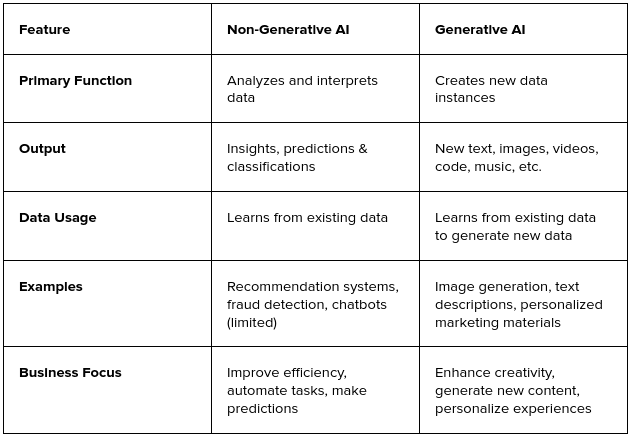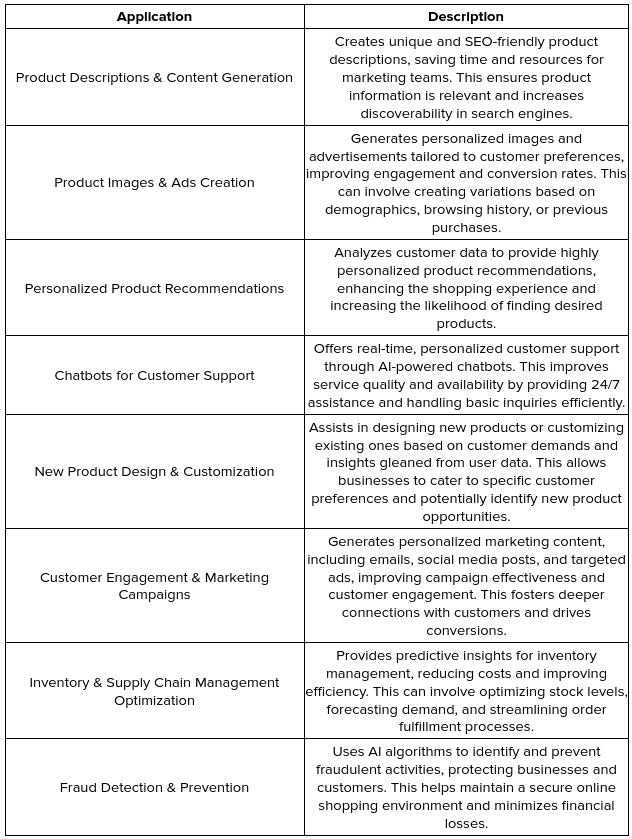Generative AI is emerging as a powerful tool for e-commerce businesses, offering the potential to revolutionize customer journeys.
Introduction to Generative AI in Ecommerce:
Overview of Generative AI
Generative AI refers to artificial intelligence technologies that can generate new content, including text, images, and videos, by learning from existing data. Unlike traditional AI, which analyzes data and provides insights, generative AI produces new, previously unseen outputs.
You can rapidly transform customer experiences by exploring the full potential of generative AI in your ecommerce platform. Companies like Omind specialize in harnessing this technology to create unparalleled customer journeys.
Importance and Growing Presence in E-commerce:

In the fiercely competitive e-commerce arena, customer experience reigns supreme. Generative AI is revolutionizing how businesses connect with shoppers. It goes beyond data analysis, actively creating personalized content and interactions. This translates to significant advantages: highly relevant product recommendations, targeted marketing campaigns, and automated tasks. By personalizing the customer journey at every turn, generative AI fuels sales growth, fosters customer loyalty, and unlocks operational efficiency – making it an essential tool for e-commerce success.
Differences Between Non-Generative and Generative AI:

Advantages of Generative AI for E-Commerce:
Generative AI unlocks a powerful toolkit for e-commerce success. By personalizing content and recommendations, it caters to individual preferences, leading to increased customer satisfaction and sales. This personalized approach fosters loyalty and repeat business, giving you a competitive edge.
Large Language Models (LLMs) are a powerful subset of generative AI that understand and generate human-like text. They offer significant benefits, including:
Enhanced Customer Service:
AI-powered chatbots handle inquiries 24/7, providing personalized solutions and efficient support.
Streamlined Operations:
LLMs automate repetitive tasks like content creation and product descriptions, freeing up resources for strategic initiatives.
By leveraging generative AI and LLMs, e-commerce businesses can unlock a future of:
Personalized Experiences:
Every touchpoint is tailored to individual needs, fostering deeper connections and engagement.
Targeted Marketing:
Personalized messaging and content resonate with audiences, driving conversions and sales.
Data-Driven Decisions:
Gain actionable insights from AI analysis to optimize strategies and product offerings.
To truly elevate customer satisfaction and sales through personalized experiences, partnering with experts like Omind can help you leverage generative AI effectively and efficiently.
Generative AI Applications in E-Commerce:


Key Modalities of Generative AI in E-Commerce:

Text, Image, Audio, Video, and 3D Representations
Generative AI isn't a one-dimensional tool. It excels in a rich orchestra of modalities, including text, image, audio, video, and even 3D representations. This versatility unlocks a treasure trove of applications that can transform the e-commerce experience.
Applications of These Modalities in Ecommerce
Bringing Products to Life: Enhanced Product Visualization
Imagine generating high-quality, SEO-friendly product descriptions in seconds. Or, take it a step further and create stunning product images directly from those descriptions. Generative AI can even craft personalized 3D models, allowing customers to virtually interact with products before they buy. This immersive experience fosters a deeper connection with products and boosts purchasing confidence.
The Power of Personalization: Content Creation Tailored to You
Generative AI goes beyond product descriptions. It can craft personalized marketing materials that resonate with individual preferences. Think targeted email campaigns with compelling product suggestions, or social media posts that speak directly to a customer's interests. AI can even generate custom video ads that showcase products relevant to a viewer's past browsing history. This personalized touch fosters deeper customer engagement and significantly increases the impact of marketing efforts.
Beyond the Screen: Interactive Customer Experiences
The future of e-commerce is interactive, and generative AI is leading the charge. Imagine AI-powered chatbots that understand natural language and can answer customer inquiries in a nuanced and helpful way. This eliminates long wait times and provides a more personalized level of service. Generative AI can also create audio recommendations, suggesting products based on a customer's past purchases or listening habits. This adds a whole new layer of engagement and fosters a more immersive shopping journey.
Implementing Generative AI in E-Commerce Platforms
Integrating Generative AI into Ecommerce Systems
The successful use of generative AI in e-commerce relies on smooth integration with existing systems. This involves ensuring compatibility between AI tools and your current e-commerce platform and workflows. Achieving seamless operation allows AI to function effectively within your established processes, maximizing its impact on your business.
Steps for Seamless Implementation
There are key steps to follow for a smooth implementation of generative AI in your e-commerce platform. First, you'll need to choose the right AI tools that align with your specific needs and goals. This is followed by preparing high-quality datasets to train the AI models. Once the data is prepared, the models can be trained to learn and generate the desired outputs, such as product descriptions or personalized content. Finally, the AI solutions can be deployed in stages, allowing you to monitor performance and make adjustments as needed before full integration.
Challenges and Considerations in Generative AI Adoption
Several challenges and considerations come with adopting generative AI in e-commerce. One concern is data privacy, ensuring customer data is handled responsibly and adheres to relevant regulations. Another challenge is model bias, where the AI model might inherit biases present in the training data. This necessitates careful data selection and monitoring to mitigate bias in the generated outputs. Finally, generative AI models require ongoing monitoring and updates to maintain accuracy and effectiveness as customer behavior and market trends evolve.
Top Generative AI Tools for E-Commerce
Brief Overview of Top Generative AI Tools
The e-commerce landscape offers a variety of generative AI tools that can enhance your business. These tools encompass a range of functionalities including content generation, personalized recommendations, customer service chatbots, and advanced analytics. By utilizing these tools, you can streamline operations, personalize the customer experience, and gain valuable insights to optimize your business strategy.
Personalized Recommendations and Customer Service Bots
Some of the leading generative AI tools, such as GPT-3 and other large language models (LLMs), excel in creating personalized interactions and support for your customers. These AI systems can be trained on your product data and customer behavior to generate personalized product recommendations, answer customer questions in a natural language format, and even provide basic troubleshooting assistance. This allows you to deliver a more engaging and efficient customer experience, potentially leading to increased sales and customer satisfaction.
Sentiment Analysis and Customer Feedback Tools
AI-powered tools can analyze customer reviews, social media comments, and other forms of feedback to generate valuable insights. You can leverage these tools to understand customer preferences, identify areas for improvement, and gauge overall customer satisfaction. By analyzing sentiment and feedback, you gain a deeper understanding of your customer base, allowing you to tailor your offerings and marketing strategies to better meet their needs.
AI-Driven Analytics for Predictive Insights
Generative AI can be harnessed to create powerful predictive analytics tools. These tools analyze vast amounts of data, including customer behavior, market trends, and sales history, to forecast future trends and consumer behavior. This allows you to make data-driven decisions about inventory management, product development, and marketing campaigns. By anticipating future demand and customer preferences, you can gain a competitive edge and optimize your business strategy for long-term success.
Personalization and Customer Experience
Dynamic User Experiences for Enhanced Engagement
Generative AI plays a key role in crafting dynamic user experiences for your e-commerce platform. This is achieved through the generation of personalized content and product recommendations. Imagine a scenario where a customer browsing your website is greeted with product suggestions tailored to their past purchases and browsing history. Generative AI can analyze customer data to achieve this level of personalization, making the shopping experience more engaging and relevant for each individual. This can lead to increased customer satisfaction and a higher likelihood of conversion.
AI in Personalizing Shopping Experiences at Scale
One of the significant advantages of generative AI is its ability to personalize the shopping experience at scale. Traditional personalization methods might become cumbersome and impractical as your customer base grows. However, generative AI can handle vast amounts of data, allowing it to personalize experiences for each customer, regardless of the size of your business. This ensures that every customer feels valued and receives targeted recommendations that cater to their specific needs and interests.
Benefits of Personality AI for Customer Loyalty and Retention
Generative AI can go beyond simply personalizing product recommendations. By analyzing customer data and interactions, AI models can even begin to understand customer personalities. This allows you to tailor the entire shopping experience, from product suggestions to marketing messages, to resonate with each customer's unique preferences. This deeper level of personalization can foster stronger customer loyalty and encourage repeat business. By understanding and catering to individual personalities, you can build lasting relationships with your customer base, leading to long-term success for your e-commerce business.
Marketing and Customer Acquisition
Automated Content Creation for Marketing
Generative AI can be a powerful tool for streamlining your marketing efforts. One key benefit is the ability to automate content creation. AI-powered tools can generate various marketing materials, such as product descriptions, social media posts, and even email campaigns. This allows you to produce high-quality content quickly and efficiently, saving you time and resources. Additionally, generative AI can be used to personalize this content for different audience segments, further enhancing the effectiveness of your marketing campaigns.
Using Generative AI for Ad Creatives
Reaching your target audience effectively requires compelling and personalized ad creatives. Generative AI can assist in this area by creating personalized and impactful ad copy, product descriptions, and visuals. By analyzing customer data and preferences, AI can tailor ad creatives to resonate with specific audience segments. This targeted approach can significantly improve the performance of your marketing campaigns, leading to higher click-through rates and conversion rates.
Language Translation and Voice Shopping
Generative AI has the potential to broaden your customer base and reach a global audience. Language translation tools powered by AI can automatically translate your website content and marketing materials into different languages, making your products and services accessible to customers worldwide. Furthermore, AI can facilitate voice-activated shopping experiences. This allows customers to search for products and complete purchases using simple voice commands, increasing convenience and accessibility for your customers. By embracing these capabilities of generative AI, you can expand your reach, attract new customers, and drive sales growth.
Impact on Operational Efficiency
Automating Tasks for Profitability
AI automation of routine tasks reduces costs and improves margins, contributing to overall profitability.
Improving Inventory and Order Management
AI-driven systems optimize inventory levels and streamline order processing, enhancing operational efficiency.
Real-Time Data Analysis and Insights for Decision Making
Generative AI provides actionable insights from real-time data, supporting informed decision-making and strategic planning.
Challenges in Utilizing Generative AI
Data Quality and Harmonization
One of the significant challenges in utilizing generative AI effectively is ensuring high-quality, harmonized data. Generative AI models rely on vast amounts of data to learn and produce accurate outputs. However, data quality can be a major hurdle. Inconsistent data formats, missing values, and errors can all negatively impact the performance of AI models. Furthermore, data from different sources may need to be harmonized to ensure consistency and allow for accurate analysis. Addressing these data quality and harmonization challenges is crucial for successfully implementing generative AI and reaping its full benefits.
Maintaining Customer Trust
As businesses embrace generative AI, it's essential to maintain customer trust in AI-enhanced services. This can be achieved by striking a balance between innovation and customer privacy and security. Customers should be informed about how their data is being used to train AI models, and they should have control over how their data is shared. Additionally, businesses need to implement robust security measures to protect customer data from unauthorized access or misuse. By prioritizing transparency, privacy, and security, businesses can build trust with their customers and ensure the long-term success of their AI initiatives.
Ethical Considerations and Responsible AI Usage
The ethical implications of generative AI require careful consideration. One concern is bias mitigation. If the data used to train AI models contains biases, these biases can be perpetuated in the AI's outputs. It's crucial to implement strategies to identify and mitigate biases in the data and the AI models themselves. Furthermore, businesses need to be transparent about how they are using generative AI and the potential limitations of this technology. By adopting a responsible approach to AI usage, businesses can ensure that generative AI is implemented ethically and contributes to positive outcomes for both businesses and customers.
Future Prospects and Innovations in Generative AI
Potential for AR/VR Shopping Experiences
The future of e-commerce might involve immersive and interactive shopping experiences powered by generative AI and augmented reality (AR) or virtual reality (VR) technologies. Imagine a scenario where customers can virtually try on clothes in their living room using AR or explore a 3D replica of a physical store using VR. Generative AI can play a crucial role in these experiences by creating realistic product simulations and personalizing the virtual environment based on customer preferences. This has the potential to revolutionize the shopping experience, making it more engaging and convenient for customers.
Hyper-Personalized Marketing Through AI
Generative AI holds immense potential for creating highly personalized marketing strategies that resonate with individual customers. By analyzing vast amounts of customer data, AI can predict individual preferences and tailor marketing messages accordingly. This could involve generating personalized product recommendations, targeted ad campaigns, and even customized email marketing content. Hyper-personalization through AI can lead to more effective marketing campaigns with higher conversion rates and ultimately drive customer loyalty and sales growth.
Challenges and Ethical Considerations for Future Advancements
As generative AI and related technologies like AR/VR evolve, businesses must navigate challenges related to ethics, privacy, and technology adoption. Ethical considerations around bias mitigation and responsible data use will remain crucial. Furthermore, ensuring customer privacy and security in these new immersive shopping experiences will be paramount.
Additionally, businesses need to be prepared for the challenges of technology adoption, such as ensuring broad customer access to AR/VR hardware and creating user-friendly interfaces for these new technologies. By addressing these challenges and prioritizing responsible innovation, businesses can leverage the potential of generative AI and related technologies to create a more engaging and personalized shopping experience for customers in the future.
AUTHOR
Team Omind
Empowering Businesses with Unified Customer Experience Platform, Leveraging Advanced AI and Intelligent Automation
PRODUCT
Gen AI Chatbot
Share LINK
Related Blogs







